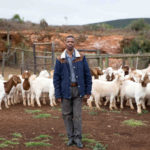High Court rules against South Africa’s largest trophy-hunting farm
A judge lambasted game farmer Arthur Rudman for alleging he was threatened by former workers. But with the farm’s empowerment scheme being liquidated, the fight is only beginning.
Author:
5 June 2019

Sundays were always important for Zwelothando Moni, 53, and his family. They attended church and, afterwards, would all sit down to a long lunch together. But for the past year, Moni has been unable to visit the home of his sister, her husband and their family.
Moni is one of 16 former workers at Blaauwkrantz farm who were interdicted from being within 100m of the farm or “interfering” with its customers or damaging the reputation of its owner, Arthur Rudman. This included any communication with Blaauwkrantz’s clients.
But the family’s Sunday rituals are set to begin again on the farm where Moni and his family were born and grew up, and where his sister still lives.
Acting judge Apla Bodlani dismissed the interim interdict in a judgment handed down on 21 May and Moni is over the moon. “It feels very good,” he shouted into the phone when talking to New Frame.
Justifiable grievances
Rudman, whose family has farmed on Blaauwkrantz in the Sundays River Valley north of Port Elizabeth since the 1930s, had applied to the court to make the interdict permanent. At almost 40 500 hectares (405km²), the Rudmans have turned Blaauwkrantz into South Africa’s largest trophy-hunting farm.
Bodlani appeared to reference this history when he framed his judgment in terms of South Africa’s “multitude of justifiable grievances derived from past oppression, racial and economic domination”.
In its three scathing opening paragraphs, the judgment sets out the impossibility of overcoming the deep racial and economic divisions in South African society if “one section of the population is licensed to see itself as targets because its members, though economically dominant, comprise one of the minority groups”.
Bodlani went on: “For the Blacks to be truly liberated from the monster that our racial and economic past is and for the Whites to be truly liberated from the same evils, all sectors of the society must be open to being confronted on who they are, what they stand for and on what they are thought to be.”
Land reform gone wrong
The 16 workers are the beneficiaries of Blaauwkrantz Share Equity, a failed land reform project at Prentice Kraal, a farm that borders on Rudman’s mammoth trophy-hunting farm.
The interdict resulted from communications between Rudman and the workers during disputes over the management of the project. The workers alleged at the time, among other things, that they had not agreed to the extortionate terms of an initial loan provided by Rudman and that the decisions the farmer has made while managing the project have siphoned game and profits from Prentice Kraal into Blaauwkrantz.
Related article:
In his judgment, Bodlani said the establishment of the land reform project “is something to be applauded … [although the] same cannot be said for its management”.
Among the communications that Rudman told the court were threatening and defamatory were letters in which the workers told the farmer that they were “fighting you against injustices” and that he should “brace yourselves for more open and robust engagement”. The workers also sent a letter to more than 150 of Blaauwkrantz’s international clients, alleging among other things that Rudman had stolen land and dividends from them.
Not over
In dismissing the interdict and ordering Rudman to pay the workers’ legal bill, Bodlani “declined the invitation to delve into the merits of the matter”. He passed the responsibility of considering the content of the communications between Rudman and the workers on to the equality court.
Moni said the workers are delighted at having gotten the interdict dismissed. “We are very happy, very happy about this, about it being gone, that we can at least now visit with each other,” he said. But referencing the upcoming battle over the liquidation of Blaauwkrantz Share Equity, he said that the fight is not over. “The farm hasn’t been put into our names yet.”
It is a fight that runs deep for Moni. He is among the workers who have worked for the Rudman family for generations. Even the nickname he still bears – Apie, Afrikaans for “little monkey” – was given to him at a young age by Rudman’s father. Rudman and his sons still refer to Moni as Apie.
The future of Blaauwkrantz Share Equity, together with those of Moni and the other workers who were intended to benefit from the project, now depends on the looming liquidation proceedings.
Update, 5 June 2019: Since this story was published, Rudman has applied for leave to appeal the high court ruling.

